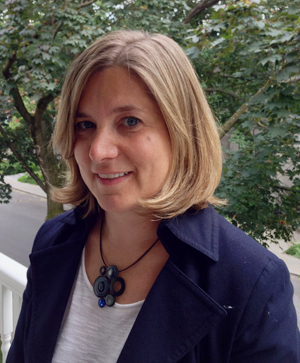Doctor Karine Igartua of MUSIC - Grand Marshal of Montreal Pride
 The seventh edition of Montreal Pride begins Monday, August 12. For the lesbian, gay, bisexual and transgender (LGBT) community and its allies, it elicits an opportunity to celebrate sexual and gender diversity. It also draws attention to the issues affecting LGBT persons in Quebec and around the world. This year, McGill University Health Centre (MUHC) Director of the McGill University Sexual Identity Centre (MUSIC) Dr. Karine Igartua was chosen as one of its Grand Marshals.
The seventh edition of Montreal Pride begins Monday, August 12. For the lesbian, gay, bisexual and transgender (LGBT) community and its allies, it elicits an opportunity to celebrate sexual and gender diversity. It also draws attention to the issues affecting LGBT persons in Quebec and around the world. This year, McGill University Health Centre (MUHC) Director of the McGill University Sexual Identity Centre (MUSIC) Dr. Karine Igartua was chosen as one of its Grand Marshals.
As a Grand Marshal, Dr. Igartua will be speaking at several press conferences and attending special events of Montreal Pride, including a peaceful vigil before the Russian Consulate on Tuesday, August 13, to protest a series of discriminatory and homophobic laws that have recently passed in Russia. The following day, she will give a speech at the official raising of the rainbow flag ceremony and on Saturday, August 17 she will be opening Community Day, an event that showcases community groups, businesses and sports teams run by or catering to the LGBT community. Finally, she will be part of the parade on Sunday, August 18.
“I feel honoured to be able to participate in this way,” says Dr. Igartua. “I accepted this offer not only because it is important to showcase to the world the success of Quebec’s approach to the LGBT community, but also because I was hoping to bring visibility to the MUSIC clinic of the Montreal General Hospital, our specialized mental health clinic which helps people with sexual orientation issues.
Dr. Igartua co-founded MUSIC in 1999, and it was created to help treat mental suffering related to homophobia, heterosexism and transphobia. “When we first started, we were primarily clinically oriented, so we dealt one-on-one with issues of discrimination, bullying, and internalized homophobia. We also provided therapy for those who had difficulty coming to terms with their own sexual attractions,” explains Dr. Igartua. “But as the clinic evolved, we also realized that we could help a greater number by engaging in primary prevention, that is by working in the community to reduce homophobia before it creates psychic distress.”
Unfortunately, one area discrimination can and does occur is in the medical field. Gay men are sometimes asked to submit to a battery of tests for sexually transmitted diseases because of the perception that they are promiscuous; lesbian women are denied pap tests because they are assumed not to have penetrative sex; and trans individuals often experience a great deal of harassment and ridicule from their physicians. “It is for this reason that my colleague Dr. Richard Montoro and I also teach in the regular curriculum for medical students and psychiatry residents. Everyone receives training in basic LGBT health issues.”
However, Dr. Igartua is quick to point out that MUSIC is not “the rainbow” clinic. “We are very discreet precisely because our services must also cater to persons uncomfortable with their sexual identity, or who would fear stepping into a clinic located in the Gay Village, whether because of religious, community or family reasons,” she explains.
While issues of discrimination against the LGBT community in Quebec are still present, the province is today one of the most welcoming places in the world for LGBT individuals. “In Quebec, we have marriage equality and civil unions, we have survivor benefits, and we have parental rights. That’s not to say that things are perfect – there are still pockets of discrimination that occur throughout the province, as well as some legal issues that affect the gay and transgendered community especially – and this is why Montreal Pride is so important: it gives a voice to a community that used to be silenced, and gives hope for people struggling for acceptance because of their gender of sexual orientation.”
